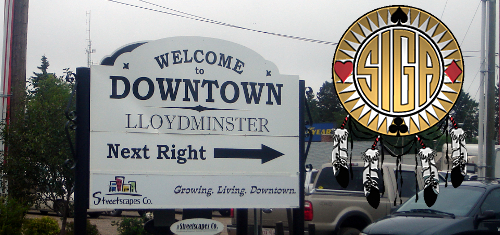 The Canadian province of Saskatchewan will get a new tribal casino in the city of Lloydminster after the provincial government signed off on the plan.
The Canadian province of Saskatchewan will get a new tribal casino in the city of Lloydminster after the provincial government signed off on the plan.
On Tuesday, Saskatchewan granted conditional approval for the Federation of Saskatchewan Indian Nations (FSIN) to operate a casino in Lloydminster, a northern city that straddles the border with Alberta (and is not too far from the birthplace of a certain gaming industry pioneer with whom this site shares its name).
There’s no firm date for when shovels might hit the ground, as FSIN must first get municipal approval from the city, develop a community consultation plan and such. But FSIN chief Bobby Cameron said the plan was to get construction underway “as soon as possible.”
Saskatchewan Liquor and Gaming Authority minister Don McMorris told reporters that the proposed venue would not be a “large, large casino,” with a gaming component of “roughly four or five gaming tables and 250 [slot] machines.”
FSIN’s gaming arm, the Saskatchewan Indian Gaming Authority (SIGA), already operates six casinos in the province that employ over 1,800 people, 65% of whom are First Nations. Half the profits generated by SIGA casinos fund development projects led by the First Nations Trust, while one-quarter goes to fund initiatives in casino-hosting communities and the other quarter goes to the province.
CONNECTICUT TRIBES SAY FEDS OKAY WITH THIRD CASINO
In Connecticut, the state’s two tribal casino operators are celebrating a federal government department okaying their plan to open a jointly run third tribal casino near the state’s northern border with Massachusetts.
On Tuesday, the Mohegan and Mashantucket Pequot tribes released letters received from the Bureau of Indian Affairs stating that the BIA’s initial examination had found that the third casino plan didn’t conflict with either the federal Indian Gaming Regulatory Act or the exclusivity provisions of the state’s tribal gaming compacts.
Last year, the state government approved Special Act 15-7, which allowed the tribes’ MMCT Venture to operate a casino off tribal lands. But MMCT announced on Tuesday that new revenue-sharing amendments to the compacts won’t be submitted to legislators for approval until the next legislative session.
By that time, MMCT hopes to have established a firm location for its new casino. It’s even possible (although unlikely) that the lawsuit bankrolled by MGM Resorts challenging the constitutionality of Special Act 15-7 may have reached some conclusion.
